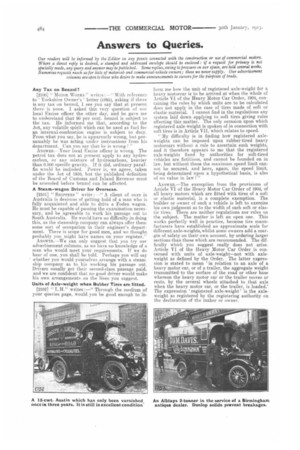Answers to Queries.
Page 24

If you've noticed an error in this article please click here to report it so we can fix it.
Our readers will be informed by the Editor on any Points connected zelith the construction Or use of commercial motors. Where a direct reply is desired, a stamped and addressed envelope should be enclosed : if a request for privacy is not specially made, any query and answer may be published. Some replies, owing to Pressure on our space, are held several weeks. Numerous requests reach us for lists of motorcab and commercial-vehicle owners ; these we never supply. Our advertisement columns are oPen to those who desire to make announcements to owners for the pirposes of trade.
Any Tax on Benzol?
[2100] " MOTOR WORKS" writes :—" With reference to ' Yorkshire Owner's ' letter (D/95), asking if there is any tax on benzol, I see you say that at present there is none. I asked this very question of our local Excise officer the other day, and he gave me to understand that 90 per cent. benzol is subject to the tax. He informed me that, according to the Act, any volatile spirit which can be used as fuel for an internal-combustion engine is subject to duty, From what you say, he is apparently wrong, but presumably he was acting under instructions from his department. Can you say that he is wrong " ANswait.—Your local Excise officer is wrong. The petrol tax does not, at present apply to any hydrocarbon, or any mixture of hydrocarbons, heavier than 0.800 specific gravity. H it did, ordinary paraffin would be included. Power is, we agree, taken under the Act of 19-10, but the published definition of the Board of Customs and Inland Revenue must be amended before benzol can be affected.
A Steam-wagon Driver for Overseas.
[2101] " SHIPPERS " write : A client of ours in Australia is desirous of getting hold of a man who is fully acquainted and able to drive a Foden wagon. He must be capable of passing the examination necessary, and be agreeable to work his passage out to South Australia. He would have no difficulty in doing this, as the steamship company can always offer them some sort of occupation in their engineer's department. There is scope for good men, and we thought probably you might have names on your register."
ANswEle.—We can only suggest that you try our advertisement columns, as we have no knowledge of a man who would meet your requirements. If we do hear of one, you shall be. told. Perhaps you will say whether you would yourselves arrange with a steamship company as to. his working his passage out. Drivers usually get their second-class passage paid, and we are confident that no good driver would make his own arrangements on the lines you suggest.
Units ol Axle-weight when nubbin, Tires are fitted.
[21021 " LIT." writes Through the medium of your queries page, would you be good enough to in form me how the unit of registered axle-weight for a heavy motorcar is to be arrived at when the whole of Article VI of the Heavy Motor Car Order, 1904, containing the rules by which units are to be calculated does not apply in the ease. of tires made of soft or elastic material. I cannot find in the regulations any system laid down applying to soft tires giving rules affecting this matter. The only occasion upon which registered axle-weight is spoken of in connection with soft tires is in Article VII, which relates to speed.
"My difficulty is in finding how registered axleweights can be imposed upon rubber-tired heavy motorcars without a rule to ascertain such weights, and it therefore appears to me that the registered axle-weights fixed by authorities for soft-tired vehicles are fictitious, and cannot be founded on in law, but without these the maximum speed limit cannot be secured, and here, again, the speed limit, being determined upon a hypothetical basis, is also of no value in law ?"
ANSWER.—The exemption from the provisions of Article VI of the Heavy Motor Car Order of 1904, of all heavy motors which are fitted with tires of a soft or elastic material, is a complete exemption. The builder or owner of such a vehicle is left to exercise his own judgment as to the width of su-ch soft or ela,stie tires. There are neither regulations nor rules on the subjectThe matter is left an open one. This works perfectly well in practice, because tire manufacturers have established an approximate scale for different axle-weights whilst some owners add a mar-gin of safety on their own account, by ordering larger sections than those which are recommended. The difficulty which you suggest really does not arise. Article VI of the Heavy Motor Car Order is concerned with units of axle-weight—not with axleweight as defined by the Order. The latter expression is stated to mean in relation to an axle of a heavy motor car, or of a trailer, the aggregate weight transmitted to the surface of the road or other base whereon the heavy motor car or the trailer moves or rests, by the several wheels attached to that axle when the heavy motor car, or the trailer, is loaded.' The expression ' registered axle-weight' is the axleweight as registered by the registering authority on the declaration of the maker or owner.




























